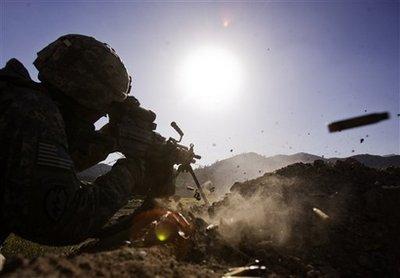WASHINGTON – The top U.S. and NATO commander in Afghanistan has reported to President Barack Obama that without more troops the U.S. risks failure in a war it’s been waging since September 2001.
“Resources will not win this war, but under-resourcing could lose it,” Gen. Stanley McChrystal wrote in a five-page Commander’s Summary. His confidential 66-page report, sent to Defense Secretary Robert Gates on Aug. 30, is now under review by Obama.
“Although considerable effort and sacrifice have resulted in some progress, many indicators suggest the overall effort is deteriorating,” McChrystal said of the war’s progress.
Geoff Morrell, a deputy assistant secretary of defense for communications issues, said in a statement the assessment “is a classified, pre-decisional document, intended to provide President Obama and his national security team with the basis for a very important discussion about where we are now in Afghanistan and how best to get to where we want to be.”
Obama, like former President George W. Bush before him, calls Afghanistan a vital bulwark against the spread of bin Laden’s al-Qaida network. But congressional Democrats have been critical of the Obama administration’s handling of the war and have spoken out against the prospects of sending more troops. McChrystal is expected to submit a second assessment in coming weeks that is widely believed to ask for more troops to fight the stalemated war.
While asserting that more troops are needed, McChrystal also pointed out in his report an “urgent need” to significantly revise strategy. The U.S. needs to interact better with the Afghan people, McChrystal said, and better organize its efforts with NATO allies.
“We run the risk of strategic defeat by pursuing tactical wins that cause civilian casualties or unnecessary collateral damage. The insurgents cannot defeat us militarily; but we can defeat ourselves,” he wrote.
In his blunt assessment of the tenacious Taliban insurgency, McChrystal warned that unless the U.S. and its allies gain the initiative and reverse the momentum of the militants within the next year the U.S. “risks an outcome where defeating the insurgency is no longer possible.”
The content of the report was first reported by The Washington Post, which said it withheld publication of portions of the document at the government’s request.
Morrell confirmed the report, but said the Pentagon would not release McChrystal’s assessment.
“While we would have much preferred none of this be made public at this time we appreciate the paper’s willingness to edit out those passages which would likely have endangered personnel and operations in Afghanistan,” Morrell said in an e-mail statement.
The Pentagon and the White House are awaiting a separate, more detailed request for additional troops and resources. Media reports Friday and Saturday said McChrystal has finished it but was told to pocket it, partly because of the charged politics surrounding the decision. McChrystal’s senior spokesman, Rear Adm. Gregory Smith, told The Associated Press on Sunday the report is not complete.
Obama is re-evaluating whether the renewed focus on hunting al-Qaida that he announced just months ago has become blurred and whether more forces will do any good.
“Are we doing the right thing?” he asked during one of a series of interviews broadcast Sunday. “Are we pursuing the right strategy?”
A spokesman for Afghanistan’s Defense Ministry said Sunday the Afghan government would not second-guess international military commanders on the need for more troops, but said that the greatest need is actually on the other side of the Afghan-Pakistan border.
In Congress, the war has taken on a highly partisan edge. Senate Republicans are demanding more forces to turn around a war that soon will enter its ninth year, while members of Obama’s own Democratic Party are trying to put on the brakes. Obama said in the Sunday interviews that he will not allow politics to govern his decision.
Nor has the president asked his top commander in Afghanistan to sit on a request for U.S. reinforcements in a backsliding war.
“No, no, no, no,” Obama responded when asked whether he or aides had directed McChrystal to temporarily withhold a request for additional U.S. forces and other resources.
But he gave no deadline for making a decision about whether to send more Americans into harm’s way.
“The only thing I’ve said to my folks is, ‘A, I want an unvarnished assessment, but, B, I don’t want to put the resource question before the strategy question,'” Obama said. “Because there is a natural inclination to say, ‘If I get more, then I can do more.'”
Obama spoke on CNN’s “State of the Union,” ABC’s “This Week,” NBC’s “Meet the Press,” and CBS’ “Face the Nation.”
Associated Press writer Rahim Faiez in Kabul contributed to this report.


Be the first to comment